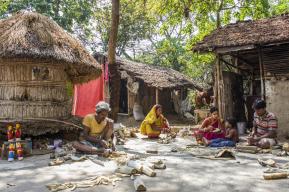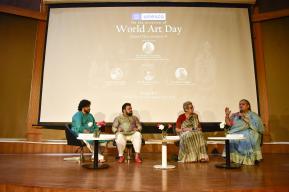News
UNESCO Seminar highlights how handicraft hubs can boost local economy
On 9-10 September 2019, UNESCO New Delhi in collaboration with its long-standing partner Banglanatak.com organized a National Seminar on Culture and Development in Kolkata. The seminar was organized as part of the concluding stage of UNESCO’s trailblazing project, Rural Crafts and Cultural Hubs (RCCH) that works towards reviving and promoting the Intangible Cultural Heritage (ICH) of West Bengal.
The two-day seminar focused on UNESCO's perspective on developing RCCH and served as a platform to share the process, strategy, learning and outcomes of the project. Mr Eric Falt, UNESCO New Delhi Director chaired a discussion on tools needed to develop cultural destinations in a sustainable fashion with officials from other Indian states like Goa, Maharahstra, Bihar, Telangana and Bhopal. Amitava Bhattacharya, Founder Director, banglanatak dot com moderated a session on introduction to grass-root cultural entrepreneurs.
The Hon’ble Minister of Finance, Industry and Micro, Small, and Medium Enterprises & Textiles (MSME&T) Dr. Amit Mitra said, “Around 1.20 lakh foreign tourists have visited the hubs which have been set up in 15 districts”.
Also, present on the occasion were Mr Alapan Bandyopadhyay (Additional Chief Secretary, Government of West Bengal, Department of Home, Industry and MSME&T), Mr. Ahmed Eiweida (Global Coordinator for Cultural Heritage and Sustainable Tourism, World Bank), and the representatives of Tourism Departments of various Indian states as well as Consulate officials from the United Kingdom, France, and Germany.
Speaking during the seminar, Mr Falt pointed out that the project rejuvenated 22 different art forms, and provided economic benefits to over 15,000 artists. He said, “Our efforts with MSME&T and Banglanatak have tried to represent this diversity by covering several crafts and associated communities like sitalpati or mat weaving, dhokra metal casting, kantha embroidery, pottery, wooden doll making, handloom textile weaving and many more."
By fruitfully converting 18 marginalized villages into vibrant cultural destinations, the project has contributed towards improving livelihood opportunities of underserved communities including women. The success of this ICH project in West Bengal has also inspired Rajasthan to sign a similar partnership with UNESCO.
The two-day seminar focused on UNESCO's perspective on developing RCCH and served as a platform to share the process, strategy, learning and outcomes of the project. Mr Eric Falt, UNESCO New Delhi Director chaired a discussion on tools needed to develop cultural destinations in a sustainable fashion with officials from other Indian states like Goa, Maharahstra, Bihar, Telangana and Bhopal. Amitava Bhattacharya, Founder Director, banglanatak dot com moderated a session on introduction to grass-root cultural entrepreneurs.
The Hon’ble Minister of Finance, Industry and Micro, Small, and Medium Enterprises & Textiles (MSME&T) Dr. Amit Mitra said, “Around 1.20 lakh foreign tourists have visited the hubs which have been set up in 15 districts”.
Also, present on the occasion were Mr Alapan Bandyopadhyay (Additional Chief Secretary, Government of West Bengal, Department of Home, Industry and MSME&T), Mr. Ahmed Eiweida (Global Coordinator for Cultural Heritage and Sustainable Tourism, World Bank), and the representatives of Tourism Departments of various Indian states as well as Consulate officials from the United Kingdom, France, and Germany.
Speaking during the seminar, Mr Falt pointed out that the project rejuvenated 22 different art forms, and provided economic benefits to over 15,000 artists. He said, “Our efforts with MSME&T and Banglanatak have tried to represent this diversity by covering several crafts and associated communities like sitalpati or mat weaving, dhokra metal casting, kantha embroidery, pottery, wooden doll making, handloom textile weaving and many more."
By fruitfully converting 18 marginalized villages into vibrant cultural destinations, the project has contributed towards improving livelihood opportunities of underserved communities including women. The success of this ICH project in West Bengal has also inspired Rajasthan to sign a similar partnership with UNESCO.

18 September 2019
Last update:20 April 2023






